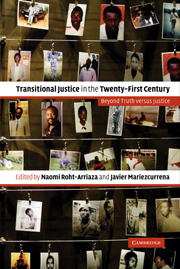Book contents
- Frontmatter
- Contents
- List of contributors
- Acknowledgments
- The new landscape of transitional justice
- Part I Truth, justice, and multiple institutions
- Part II Levels of justice: Local, national and international
- Introduction to Part II
- 7 A new approach to restorative justice – East Timor's Community Reconciliation Processes
- 8 Justice at the grassroots? Gacaca trials in Rwanda
- 9 Bremer's “Gordian Knot”: Transitional justice and the US occupation of Iraq
- 10 Truth, justice and stability in Afghanistan
- 11 The prosecution of Hissène Habré: International accountability, national impunity
- 12 Argentina's contribution to global trends in transitional justice
- 13 Transitional justice: Lessons learned and the road ahead
- Index
13 - Transitional justice: Lessons learned and the road ahead
Published online by Cambridge University Press: 05 June 2012
- Frontmatter
- Contents
- List of contributors
- Acknowledgments
- The new landscape of transitional justice
- Part I Truth, justice, and multiple institutions
- Part II Levels of justice: Local, national and international
- Introduction to Part II
- 7 A new approach to restorative justice – East Timor's Community Reconciliation Processes
- 8 Justice at the grassroots? Gacaca trials in Rwanda
- 9 Bremer's “Gordian Knot”: Transitional justice and the US occupation of Iraq
- 10 Truth, justice and stability in Afghanistan
- 11 The prosecution of Hissène Habré: International accountability, national impunity
- 12 Argentina's contribution to global trends in transitional justice
- 13 Transitional justice: Lessons learned and the road ahead
- Index
Summary
The cases in this volume, which cover a broader spectrum of post-atrocity “accountability” scenarios than any previous study, offer an opportunity to think afresh about what is needed to achieve justice in the aftermath of massive, deliberately inflicted human suffering. All entail deliberate and institutionalized efforts to achieve justice. All were designed and implemented in preparation for, or in the aftermath of, a political transition. All involve some degree of negotiation among parties who were involved in causing abuses and parties who suffered as a result of the crimes. All have both domestic and international components. Moreover, all of the proposed accountability measures were justified in relation to two central, inter-related goals: (1) to respond to the suffering from past abuses; and (2) to prevent similar suffering from happening in the future.
Opportunities for victims and others to tell their stories, and for public acknowledgment of wrongs, accurately told – the most common objectives of truth commissions – are usually justified as measures to ease past suffering. Reparations processes, to the extent that they aim to remedy past harms, are also past-focused. In addition, trials of perpetrators, justified as vehicles for quelling individual or societal needs for justice, fall within the response to past violations goal.
Preventive goals are more numerous. Some, such as preventing past perpetrators from reasserting power or discouraging future perpetrators, are deterrence-driven.
Information
- Type
- Chapter
- Information
- Transitional Justice in the Twenty-First CenturyBeyond Truth versus Justice, pp. 325 - 341Publisher: Cambridge University PressPrint publication year: 2006
Accessibility standard: Unknown
Why this information is here
This section outlines the accessibility features of this content - including support for screen readers, full keyboard navigation and high-contrast display options. This may not be relevant for you.Accessibility Information
- 16
- Cited by
